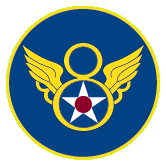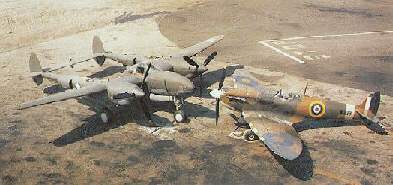 " THE CASE OF THE BLINKING SPINNER"
" THE CASE OF THE BLINKING SPINNER"
By: Col. Royal Frey
As many of you may recall, at the far west end of the two-mile grass runway at Wittering RAF Station was a small landing strip running north and south that was named Collyweston. It was there that the RAF maintained a batch of captured enemy airplanes that had already been thoroughly tested and evaluated by the RAF at some other location. Whenever I would have some spare time, I would pedal my bicycle down to Collyweston and get some cockpit time in one of the two FW-190As assigned there. The RAF fellow in charge had told me that if I could get someone to check me out in the Spitfire kept at Wittering, he'd letme check out in the FW-190. At the time I got shot down, I had just about convinced the RAF officer in charge of the Spit to let me "have a go" at it. But my sudden departure from the 20th. sure ruined all my dreams. Lockheed P-38 Lighning and Supermarine Spitfire Back to my story -- One of the FW-190s at Collyweston had a half black and half white spinner that tended to blink when the prop was turning. When the plane was flying, that amned spinner could be seen blinking in the distance when the plane was still too far away to indentify as to its type. One day about mid-January, 1944, Louie Brenton (my crew chief) and I were chewing the fat and I casually mentioned that blinking spinner. Then I said, "Louie, we could do the same thing, since we are Blue Flight of White Squadron." As I recall, Louie did not say much about my idea. The next time I went down to the line, there was my plane with two half white and insignia blue spinners. I recall taking it up that first time on a local jaunt of some kind and finding those blinking spinners a little disconcerting. For one thing, my Curtiss props turned quite a bit faster than the FW-190 prop, so my blinks were alot faster. But I soon got used to the sensation of flashing on both sides of me. Well, about a week or so after this "local modification," I came in, peeled up and landed. Now, you have to remember that our approach to Wittering from the east took us over the location of the Headquarters of the 67th. Wing. After I had taxied in and shut down, someone came out to my plane and yelled up at me, still in the cockpit, that I had better hurry because there was some Major from the 67th. Wing waiting to talk to me on the phone. (Incidentally, I think this was the only time I ever talked on a telephone the whole time I was in England during the war.) I rushed up to the pilots' shack, picked up the phone and said "Lt. Frey here." Then, from the other end - "Are you the pilot of that plane with the painted spinners?" Ah, I thought, some one is going to commend me for such a novel idea, and I proudly answered "Yes Sir." Then, from the other end came a shout that I could probably have heard without a telephone- "General Anderson said for you to get that paint off those spinners!!!" Then, without a further word, he hung up. I went back to the plane and told Louie what I had just gone through and headed for the barracks, pouting at my ill-fortune of having a Wing CC who had no imagination or romance in his soul. After my 4:00p.m. tea at the mess, I hopped on my bike and headed down to where Louie had towed my plane. There he was, up on a mechanic's stand, brushing on some kind of dope solvent. I got up on the stand with him and we both began scraping off the paint from the left spinner. When the left one was stripped, we moved over to the right one. I do not recall anyone else helping us to remedy our folly, but I do recall almost freezing to death long into the evening hours. The next day, there was "Stardust" with her new OD (olive drab) spinners. Louie must have gotten up real early that morning to zinc-chromate the bare metal and then spray on the new OD paint. I never learned why General Anderson had taken such offense to our innovation, but some sage character such as Long of Erlandson did suggest that it might have been because such a specially-marked plane might convince the enemy pilots that someone important was flying it and they would concentrate on knocking it down in preference to the other P-38s milling around in a dogfight. I recall thinking, "He**, that doesn't make sense. We're supposed to get them to mix it up with us to keep them from going after the bombers." Anyway, many years after all this had taken place, a thought struck me one day - why didn't Louie just paint the OD on top of the blue and white instead of going down to the bare metal in order to start all over again? Maybe one of you fellows who is an expert on such matters could clear this up for me. I'd like to think that all the scraping we did was for some good reason. Sadly, of the hundredsd of snapshots I took while in the 20th., I failed to take a phot of "Stardust" with her blinking spinners. If some one of you would happen to have a phot of her "all dressed up," I sure would appreciate a copy.
|
RETURN TO THE FREY BIO
Reprinted From King's Cliffe Remembered, Oct/Nov, 1985 Issue
Unless otherwise noted, all content © copyright The Art of Syd Edwards 1998-1999. All rights reserved and reproduction is prohibited.
